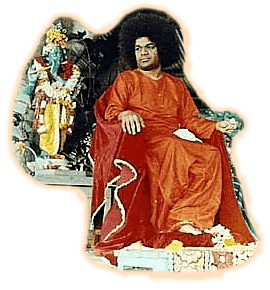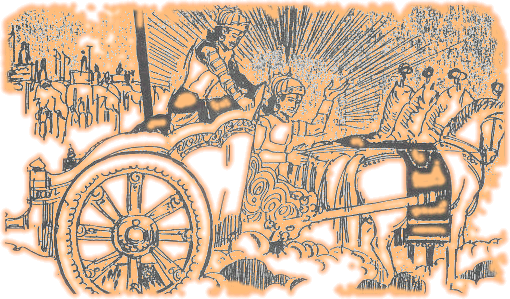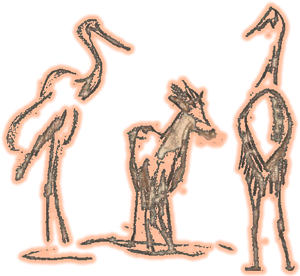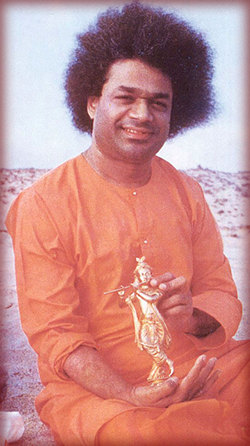|
Other Baba-books
|
||||||||
 |
The
original Sanskrit verses and with comments taken from the writings of
|
|||||||
|
'Naasti
Lobha Samo Vyaadhih There is
no disease like greed,
1 2a 2b 3 4 5 6 7 8 9 10 11 12 13 14 15 16 17 18a 18b
The
ninth chapter of the Bhagavad Gîtâ
is of paramount importance. It deals with the
râja vidya (sovereign knowledge) and
the râja guhya (sovereign secret). It
is concerned with occult experience and the
esoteric mysteries of the human soul. This chapter
is in the middle of the Gîtâ and
is like a beautiful bouquet that links the two
halves of a gorgeous garland of fragrant flowers
that the various other chapters in the Bhagavad
Gîtâ are. And in this central
chapter is contained the supreme knowledge of the
âtmâ.
-
Summer
Showers in Brindavan 1979, p. 140-1. "
Listen
to this spoken chapter in
Audio
" s'rî-bhagavân
uvâca s'rî-bhagavân
uvâca -- the Supreme Personality of Godhead
said; idam -- this; tu -- but; te -- unto you;
guhya-tamam -- the most confidential;
pravakshyâmi -- I am speaking;
anasûyave -- to the nonenvious;
jñânam -- knowledge;
vijñâna -- realized knowledge; sahitam
-- with; yat -- which; jñâtvâ --
knowing; mokshyase -- you will be released;
as'ubhât -- from this miserable material
existence. Krishna
speaks of Arjuna as anasûya,
"envy-less." What a great compliment! Therefore, He
proposed to teach him the mysteries of spiritual
discipline. -
Sathya Sai Speaks IV, p.
101. Anasûya
or the absence of envy (not spiteful), jealousy and
malice, is a prerequisite for gaining an intimate,
immediate and personal experience of the
omnipresent reality of divinity. Every spiritual
aspirant must necessarily cultivate the quality of
anasûya. It is a divine
characteristic, which makes a man's personality
pure and pellucid. râja-vidyâ
râja-guhyam râja-vidyâ
-- the king of education;
râja-guhyam
-- the king of confidential knowledge; pavitram --
the purest; idam -- this; uttamam --
transcendental; pratyaksha -- by direct experience;
avagamam -- understood; dharmyam -- the principle
of religion; su-sukham -- very happy; kartum -- to
execute; avyayam --
everlasting. ...The
knowledge that you yourself experience; that alone
can help you to be free. The teacher can be of some
help in the process; but he can not show you your
real self. You have to visualize it yourself;
besides, you have to be free from vices like envy.
Then only can you be called a purna
jñâni, one who has attained full
jñâna. He who has faith in
this jñâna, who is devoted in
acquiring it, and who is full of yearning to earn
it, only such a person can realize
Me.
-
Gîtâ Vahini, p. 153 as'raddadhânâh
purushâ as'raddadhânâh
-- those who are faithless;
purushâh
-- such persons; dharmasya -- toward the process of
religion; asya -- this; parantapa -- o killer of
the enemies; aprâpya
-- without obtaining;
mâm
-- Me; nivartante -- come back; mrityu -- of death;
samsâra
-- in material existence; vartmani -- on the
path. He
must be free from envy; besides, he must be
earnest, steeped in sr'addhâ (belief;
finding sympathy to engage in the sphere of
devotional service; trust). Earnestness is
essential even for the performance of the smallest
act by man. Not man alone, but bird and beast, worm
and virus, all have to be earnest to succeed. When
you have no earnestness or sr'addhâ in
the act, you cannot gather the
fruit.
-
Gîtâ Vahini, p. 153 -
112 mayâ
tatam idam sarvam mayâ
-- by Me; tatam -- pervaded; idam -- this; sarvam
-- all; jagat -- cosmic manifestation;
avyakta-mûrtinâ
-- by the unmanifested form;
mat-sthâni
-- in Me;
sarva-bhûtâni
-- all living entities; na -- not; ca -- also; aham
-- I; teshu -- in them; avasthitah --
situated. See
God in the stone; do not change God into stone.
That is the vision that is highly desirable. The
stone must be visualized as divine, suffused with
God; which it really
is.
-
Gîtâ Vahini, p. 163-4 na
ca mat-sthâni bhûtâni na
-- never; ca -- also; mat-sthâni -- situated
in Me; bhûtâni -- all creation; pas'ya-
just see; me -- My; yogam ais'varam --
inconceivable mystic power; bhûta-bhrit --
the maintainer of all living entities; na -- never;
ca -- also; bhûta-sthah -- in the cosmic
manifestation; mama -- My; âtmâ --
Self; bhûta-bhâvanah -- the source of
all manifestations. Bhûta-bhrin
means the bearer, supporter and sustainer of the
myriad of living creatures. Bhûta-stho
implies that He dwells in all creatures. In other
words, God is the creator, sustainer and redeemer
of all creatures and dwells in them
all.
-
Summer Showers in Brindavan 1979, p.
141 yathâkâs'a-sthito
nityam yathâ
- just as; âkâs'a-sthitah -- situated
in the sky; nityam -- always; vâyuh -- the
wind; sarvatra-gah -- blowing everywhere;
mahân -- great; tathâ -- similarly;
sarvâni bhûtâni -- all created
beings; mat-sthâni -- situated in Me; iti --
thus; upadhâraya -- try to
understand. sarva-bhûtâni
kaunteya sarva-bhûtâni
-- all created entities; kaunteya -- o son of
Kuntî; prakritim -- nature; yânti --
enter; mâmikâm -- My; kalpa-kshaye --
at the end of the millennium; punah -- again;
tâni -- all those; kalpa-âdau -- in the
beginning of the millennium; visrijâmi --
create; aham -- I. prakritim
svâm avashthabhya prakritim
-- the material nature; svâm -- of My
personal Self;avashthabhya -- entering into;
visrijâmi -- I create; punah punah -- again
and again; bhûta-grâmam -- all the
cosmic manifestations; imam -- these; kritsnam --
in total; avas'am -- automatically; prakriteh -- of
the force of nature; vas'ât -- under
obligation. Understanding
the essence of prakriti enables one to
understand the meaning and mystery of life.
-
Summer Showers in Brindavan 1979, p.
151 Prakriti
is just the lîlâ of the
Lord, set before you so that you may become aware
of His glory, His splendor.
-
Sathya Sai Speaks III, p. 29 na
ca mâm tâni karmâni na
-- never; ca -- also; mâm -- Me; tâni
-- all those; karmâni -- activities;
nibadhnanti -- bind; dhanañjaya -- o
conqueror of riches; udâsîna-vat -- as
neutral; âsînam -- situated; asaktam --
without attraction; teshu -- for those; karmasu --
activities. mayâdhyakshena
prakritih mayâ
-- by Me; adhyakshena -- by superintendence:
prakritih -- material nature; sûyate --
manifests; sa -- both; cara-acaram the moving and
the nonmoving; hetunâ -- for the reason;
anena -- this; kaunteya -- o son of Kuntî;
jagat -- the cosmic manifestation; viparivartate --
is working. "Arjuna!
I am the witness; through Me, this prakriti,
this conglomeration of the five elements called
prapancha (cosmos; created world composed of
the five elements), all these moveable and
immoveable objects are formed. Through Me as the
cause, the prapancha behaves in various
ways." -
Gîtâ Vahini, p. 153 avajânanti
mâm mûdhâ avajânanti
-- deride; mâm -- Me; mûdhâh --
foolish men; mânushîm -- in a human
form; tanum -- a body; âs'ritam -- assuming;
param -- transcendental; bhâvam -- nature;
ajânantah -- not knowing; mama -- My;
bhûta -- of everything that be;
mahâ-îs'varam -- the supreme
proprietor. "Fools
who cannot understand Me as the highest principle
and as the master of all the elements whose will
they have to obey, take Me to be just a man."
-
Gîtâ Vahini, p. 153 The
path of bhakti
is the best, under present conditions ... without
bhakti, the Lord cannot be understood,
s'akti,
however high and mighty, if it intends to protect
and foster the world, has to assume the human form
itself. That form alone will be suitable for all to
listen to and learn from, honor and serve; those
who have no bhakti will take that form as
merely human, or they cannot grasp the absolute
(supreme) principle, the paratatva (absolute
supreme principle).
-
Prasanthi Vahini , pp. 26-7 moghâs'â
mogha-karmâno mogha-âs'âh
-- baffled in their hopes; mogha-karmânah --
baffled in fruitive activities;
mogha-jñânâh -- baffled in
knowledge; vicetasah -- bewildered;
râkshasîm -- demonic;
âsurîm -- atheistic; ca -- and; eva --
certainly; prakritim -- nature; mohinîm --
bewildering; s'ritâh -- taking shelter
of. mahâtmânas
tu mâm pârtha mahâ-âtmânah
-- the great souls; tu -- but; mâm -- unto
Me; pârtha-- o son of Prithâ; daivim --
divine; prakritim -- nature; âs'ritâh
-- having taken shelter of; bhajanti -- render
service; ananya-manasah -- without deviation of the
mind; jñâtvâ -- knowing;
bhûta -- of creation; âdim -- the
origin; avyayam --
inexhaustible. It
is enough if the mind is always fixed on
paramâtmâ, if the Lord is
meditated upon without break. That will cleanse the
mind; the delusion clogging it will disappear. This
by itself comprises moksha, for what is
moksha but moha-kshaya, the decline
of delusion? A person who has achieved this
moha-kshaya will attain brahmathva,
the stage of brahman, howsoever he might
die. Such a person is called a
jñâni.
-
Gîtâ
Vahini, p. 152 satatam
kîrtayanto mâm satatam
-- always; kîrtayantah -- chanting; mâm
-- about Me; yatantah -- fully endeavoring; ca --
also; dridha-vratâh -- with determination;
namasyantah -- offering obeisances; ca -- and;
mâm -- Me; bhaktyâ -- in devotion;
nitya-yuktâh -- perpetually engaged;
upâsate -- worship. jñâna-yajñena
câpy anye jñâna-yajñena
-- by cultivation of knowledge; ca -- also; api --
certainly; anye -- others; yajantah -- sacrificing;
mâm -- Me; upâsate -- worship; ekatvena
-- in oneness; prithâktvena -- in duality;
bahudhâ -- in diversity; vis'vatah-mukham --
and in the universal form. Some
great men reverently meditate on Me as Brahman;
others worship Me under various names and in
various forms; some others worship Me through
jñâna-yajña and
âtmâ-yajña.
-
Gîtâ
Vahini, p. 153 aham
kratur aham yajñah aham
-- I; kratuh -- Vedic ritual; aham -- I;
yajñah -- smriti sacrifice; svadhâ --
oblation; aham -- I; aham -- I; aushadham --
healing herb; mantrah -- transcendental chant; aham
-- I; aham -- I; eva -- certainly; âjyam --
melted butter; aham -- I; agnih -- fire; aham -- I;
hutam -- offering. pitâham
asya jagato pitâ
-- father; aham -- I; asya -- of this; jagatah --
universe; mâtâ -- mother;
dhâtâ -- supporter; pitâmahah --
grandfather; vedyam -- what is to be known;
pavitram -- that which purifies; om-kârah --
the syllable om; rik -- the Rig Veda; sâma --
the Sâma Veda; yajuh -- the Yajur Veda; eva
-- certainly; ca -- and. gatir
bhartâ prabhuh sâkshî gatih
-- goal; bhartâ -- sustainer; prabhuh --
Lord; sâkshî -- witness; nivâsah
-- abode; s'aranam -- refuge; suhrit -- most
intimate friend; prabhavah -- creation; pralayah --
dissolution; sthânam -- ground;
nidhânam -- resting place; bîjam --
seed; avyayam -- imperishable. Whatever
the name, whatever the form of worship, I am the
recipient; I am the goal of all. I am the only one;
there is no other. I Myself become the worshipped,
through My many names and forms. Not only this; I
am the fruit of all actions, the bestower of the
fruit, the basis, the prompter, the promoter of
all. Why recount and repeat? I am the force behind
the birth, existence and death of every thing and
of every life. I am the Birthless, Deathless Cause.
-
Gîtâ
Vahini, pp. 153-4 tapâmy
aham aham varsham tapâmi
-- give heat; aham -- I; aham -- I; varsham --
rain; nigrihnâmi -- withhold; utsrijâmi
-- send forth; ca -- and; amritam -- immortality;
ca -- and; eva -- certainly; mrityuh -- death; ca
-- and; sat -- spirit; asat -- matter; ca -- and;
aham -- I; arjuna -- o Arjuna. trai-vidyâ
mâm soma-pâh
pûta-pâpâ trai-vidyâh
-- the knowers of the three Vedas; mâm -- Me;
soma-pâh -- drinkers of soma juice;
pûta -- purified; pâpâh -- of
sins; yajñaih -- with sacrifices;
ishthvâ -- worshiping; svah-gatim -- passage
to heaven; prârthayante -- pray for; te --
they; punyam -- pious; âsâdya --
attaining; sura-indra -- of Indra; lokam -- the
world; as'nanti -- enjoy; divyân --
celestial; divi -- in heaven; deva-bhogân --
the pleasures of the gods. te
tam bhuktvâ svarga-lokam vis'âlam te
-- they; tam -- that; bhuktvâ -- enjoying;
svarga-lokam -- heaven; vis'âlam -- vast;
kshîne -- being exhausted; punye -- the
results of their pious activities; martya-lokam --
to the mortal earth; vis'anti -- fall down; evam --
thus; trayî -- of the three Vedas; dharmam
--doctrines; anuprapannâh -- following;
gata-âgatam -- death and birth;
kâma-kâmâh -- desiring sense
enjoyments; labhante -- attain. ananyâs'
cintayanto mâm ananyâh
-- having no other object; cintayantah --
concentrating; mâm -- on Me; ye -- those who;
janâh -- persons; paryupâsate --
properly worship; teshâm -- of them; nitya --
always; abhiyuktânâm -- fixed in
devotion; yoga -- requirements; kshemam --
protection; vahâmi -- carry; aham --
I. "Whoever
among devotees dedicates all acts to Me with no
other thought, whoever meditates on Me, serves Me,
worships Me, remembers Me; know that I am always
with him, ever providing for him in this world and
the next; I bear the burden of his
yoga-kshema. Do you hear Me?" asked
Krishna, patting Arjuna again on the back
and imparting courage to his drooping heart.
This
most sacred sentence is as the navel to the
Gîtâ body. The navel of
Vishnu was the place where
Brahmâ took birth; this sloka
is the navel or place of nativity for those who
thirst for brahma-jñâna. If
this sloka is followed in practice, the
entire Gîtâ can be understood.
-
Gîtâ
Vahini, p. 155 The
devotee can tie up the Lord with his prema;
by eka-bhakti that overpowers his egoism.
When man is full of this type of bhakti, the
Lord will Himself bless him with everything he
needs; His grace will fulfill all his wants. Remind
yourself here of the promise made by the Lord in
the Gîtâ: yoga-kshemam
vahâmy aham, I carry the burden of his
welfare. -
Gîtâ Vahini, p. 19 The
words yoga and kshema used by the
Lord mean: yoga, acquisition of something
desirable; and kshema, the preservation of
what is thus acquired. The discipline by which you
can preserve it is: Ananyâh
cintayantah, exclusive meditation on the Lord.
That will cleanse the mind; it will make you a
bhakta. The bhakta is recognized by
these things; he talks of the Lord; he sings of
the Lord; he sees only the Lord; he works and
spends his leisure with the Lord.
-
Gîtâ Vahini, p. 167 The
Gîtâ describes genuine
dhyana as: "Those persons who adore Me
without any other thought and feeling".
-
Sanathana Sarathi, 1979, p. 209 ye
'py anya-devatâ-bhaktâ ye
-- those who; api -- also; anya -- of other;
devatâ -- gods; bhaktâh -- devotees;
yajante -- worship; s'raddhayâ anvitâh
-- with faith; te -- they; api -- also; mâm
-- Me; eva -- only; kaunteya -- o son of
Kuntî; yajanti -- they worship;
avidhi-pûrvakam -- in a wrong
way. Krishna
exhorted Arjuna to strive for the establishment
of a theocentric world. "People have different aims
and aspirations. They follow different paths for
winning My grace. I guide them along their chosen
paths and fulfill their wishes and lead them to
different goals in life," said Krishna
revealing His divinity to Arjuna.
-
Summer Showers in Brindavan 1979, p.
65 aham
hi sarva-yajñânâm aham
-- I; hi -- surely; sarva -- of all;
yajñânâm -- sacrifices;
bhoktâ -- the enjoyer; ca -- and; prabhuh --
the Lord; eva -- also; ca -- and; na -- not; tu --
but; mâm -- Me; abhijânanti -- they
know; tattvena -- in reality; atah -- therefore;
cyavanti -- fall down; te -- they. yânti
deva-vratâ devân yânti
-- go; deva-vratâh -- worshipers of demigods;
devân -- to the demigods; pitrin -- to the
ancestors; yânti -- go; pitri-vratâh --
worshipers of ancestors; bhûtâni -- to
the ghosts and spirits; yânti -- go;
bhûta-ijyâh -- worshipers of ghosts and
spirits; yânti -- go; mat -- My;
yâjinah -- devotees; api -- but; mâm --
unto Me. patram
pushpam phalam toyam patram
-- a leaf; pushpam -- a flower; phalam -- a fruit;
toyam -- water; yah -- whoever; me -- unto Me;
bhaktyâ -- with devotion; prayacchati --
offers; tat -- that; aham -- I; bhakti-upahritam --
offered in devotion; as'nâmi -- accept;
prayata-âtmanah -- from one in pure
consciousness. Even
if you offer only a leaf (patram), a flower
(pushpam), a fruit (phalam), or a
drop of water (toyam) to God in the true
spirit of devotion and surrender, the results will
be infinitely good. -
Summer Showers in Brindavan 1979, p.
160 The
Gîtâ does not intend that you
should pluck a leaf or a flower or a fruit from
some plant or tree and place it before God. Nor
does it ask you to bring water from a well or a
river or the roadside tap.The leaf is your own
body, which like a leaf, sprouts, greens, fades,
and finally falls from the branch. The flower is
the heart freed from the insect pests of lust,
anger, greed, attachment, pride, hate, etc. The
fruit is the mind, the consequence of its
yearnings, which have to be dedicated to God. The
water is the stream of tears that flow from the
eyes when one is in ecstatic bliss at the
contemplation of God's Glory. Giving these four is
the real act of (self) surrender,
saranagathi. The offering of leaves or
flowers or fruits or river water is at best a way
of helping the plant or tree or river to secure a
little merit. -
Sathya
Sai Speaks VIII, p. 157 yat
karoshi yad as'nâsi yat
-- whatever; karoshi -- you do; yat -- whatever;
as'nâsi -- you eat; yat -- whatever; juhoshi
-- you offer; dadâsi -- you give away; yat --
whatever; yat -- whatever; tapas yasi --
austerities you perform; kaunteya -- o son of
Kuntî; tat -- that; kurushva -- do; mat --
unto Me; arpanam -- as an
offering. The
Gîtâ clearly declares that only
the hridaya-pushpa, (heart lotus), free from
impurities, that grows in the
manasa-sarovar, the pellucid waters of the
mind, is worthy to be offered to God. That is the
reason why Krishna told Arjuna, "My dear
brother-in-law, whatever activity you are engaged
in, whatever gift you give, whatever food you take,
do it as a dedicated offering to Me; do everything
in the dedicatory spirit as a tribute to God; for
only such acts reach Me. I have no special
preference for anyone name; all names are Mine. I
know neither friend nor foe. I am the unaffected
witness. I reside with all who serve Me and derive
joy from that service."
-
Gîtâ
Vahini, p. 169 s'ubhâs'ubha-phalair
evam s'ubha
-- from auspicious; as'ubha -- and inauspicious;
phalaih -- results; evam -- thus; mokshyase -- you
will become free; karma -- of work; bandhanaih --
from the bondage; sannyâsa -- of
renunciation; yoga -- the yoga;
yukta-âtmâ -- having the mind firmly
set on; vimuktah -- liberated; mâm -- to Me;
upaishyasi -- you will attain. samo
ham sarva-bhûteshu samah
-- equally disposed; aham -- I;
sarva-bhûteshu -- to all living entities; na
-- no one; me -- to Me; dveshyah -- hateful; asti
-- is; na -- nor; priyah -- dear; ye -- those who;
bhajanti -- render transcendental service; tu --
but; mâm -- unto Me; bhaktyâ -- in
devotion; mayi -- are in Me; te -- such persons;
teshu -- in them; ca -- also; api -- certainly;
aham -- I I
give expression only to truth, I do not adjust
my speech to your approval or disapproval; I am not
elated when you approve. I am the same in all. But
all are not the same in Me. You have observed that
during the cold months villagers sit around a fire
at night, but only those who sit near the fire get
refreshed by the warmth. Those squatting far away
have also to put up with the darkness. If people
stay afar and complain that they do not receive the
warmth and that they have to suffer darkness, can
you ascribe it to the partiality of fire? It is
meaningless to argue from this that fire treats
different people differently. The
splendor of divine vision is akin to this - if you
seek to earn it, you have to approach it and stay
there. Everyone has equal right to do so and to
feed the fire, so that it might illumine and warm
even more. Fire is impartial; in deriving its
benefit and in making it grow into greater and
greater capacity, there are differences. I am
splendor; I have no partiality at all. To
experience Me and derive bliss from Me, all have
equal chance, opportunity and authority.
Distinctions and differences arise as a result of
the faults of the sadhakas (spiritual
aspirant). They are not blemishes in Me.
-
Gîtâ Vahini, p. 170 api
cet sudurâcâro api
-- even; cet -- if; su-durâcârah -- one
committing the most abominable actions; bhajate --
is engaged in devotional service; mâm -- unto
Me; ananya-bhâk -- without deviation;
sâdhuh -- a saint; eva -- certainly; sah --
he; mantavyah -- is to be considered; samyak --
completely; vyavasitah -- situated in
determination; hi -- certainly; sah --
he. The
Lord sees all as equal; His heart embraces all in
love; that is the reason why the world has at least
this much of peace and prosperity. The doctor may
declare that the patient has no fever just to
console the sick man; but the thermometer cannot
lie. God knows and reacts to the inner feeling, not
to the outer appearance; he can never go wrong, nor
can He be deceived. -
Gîtâ
Vahini, p. 170-1 kshipram
bhavati dharmâtmâ kshipram
-- very soon; bhavati -- becomes;
dharma-âtmâ -- righteous;
s'as'vat-s'ântim -- lasting peace; nigacchati
-- attains; kaunteya -- o son of Kuntî;
pratijânîhi -- declare; na -- never; me
-- My; bhaktah -- devotee; pranas'yati --
perishes. mâm
hi pârtha vyapâs'ritya mâm
-- of Me; hi -- certainly; partha -- o son of
Prithâ; vyapâs'ritya -- particularly
taking shelter; ye -- those who; api -- also; syuh
-- are; pâpa-yonayah -- born of a lower
family; stri yah -- women; vais'yâh --
mercantile people; tathâ -- also;
s'ûdrâh -- lower-class men; te api --
even they; yânti -- go; param -- to the
supreme; gatim -- destination. kim
punar brâhmanâh punyâ kim
-- how much; punah -- again; brâhmanâh
-- brâhmanas; punyâh -- righteous;
bhaktâh -- devotees; râja-rshayah --
saintly kings; tathâ -- also; anityam --
temporary; asukham -- full of miseries; lokam --
planet; imam -- this; prâpya -- gaining;
bhajasva -- be engaged in loving service; mâm
-- unto Me. man-manâ
bhava mad-bhakto mat-manâh
-- always thinking of Me; bhava -- become; mat --
My; bhaktah -- devotee; mat -- My; yâjî
-- worshiper; mâm -- unto Me; namaskuru --
offer obeisances; mâm -- unto Me; eva --
completely; eshyasi -- you will come; yuktvâ
-- being absorbed; evam -- thus;
âtmânam -- your soul;
mat-parâyanah -- devoted to
Me. Become
One with Me; be devoted to Me; bow down to Me;
unifying thus yourself, you will surely come to Me.
-
Sanathana Sarathi, 1978, p. 165 "Fix
thy thought on Me; be devoted to Me; worship and do
homage to Me; thou shall reach Me. The truth do I
declare to thee; for thou are dear to Me. This is
my teaching, My Grace."
-
Gîtâ Vahini, p. 7 Gudâka
(Gudâkes'a): nickname for Arjuna: he who
has overcome sleep.
|
||||||||






